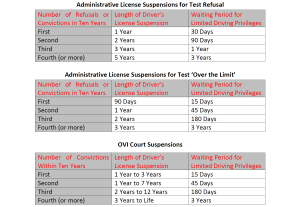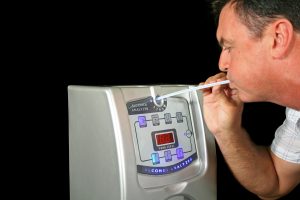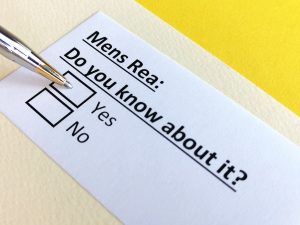 In DUI cases (called ‘OVI’ in Ohio), a defendant’s blood or urine sample may be tested by a crime lab to determine the concentration of alcohol and/or drugs in the sample. In court, a lab analyst testifies regarding the blood or urine testing and the results of the test. But what if the analyst testifying is not the analyst who conducted the test? The recent case of Smith v. Arizona addressed whether this violates the defendant’s right to confront witnesses.
In DUI cases (called ‘OVI’ in Ohio), a defendant’s blood or urine sample may be tested by a crime lab to determine the concentration of alcohol and/or drugs in the sample. In court, a lab analyst testifies regarding the blood or urine testing and the results of the test. But what if the analyst testifying is not the analyst who conducted the test? The recent case of Smith v. Arizona addressed whether this violates the defendant’s right to confront witnesses.
Articles Tagged with Ohio DUI Laws
Can a Driver Arrested for DUI/OVI Revoke Consent to a Blood Test?

When an officer arrests a driver for DUI (called ‘OVI’ in Ohio), the officer typically requests that the driver consent to a blood, breath, or urine test. However, a statute in the Ohio Revised Code (section 4511.191) says a driver arrested for OVI implicitly consents to those tests. Can a driver arrested for OVI revoke that consent? This question has not been directly addressed in Ohio but was recently answered by the Supreme Court of Colorado.
When Are Officers Permitted to Administer Breath Alcohol Tests?
 The Ontario Provincial Police (OPP) recently implemented a policy of administering a breath alcohol test to every driver stopped for a traffic offense. Even if the stop is for a minor violation, and even if the officer has no suspicion the driver is under the influence, the driver must submit to a breath test. Refusing the test is a criminal offense. Could this happen in Ohio?
The Ontario Provincial Police (OPP) recently implemented a policy of administering a breath alcohol test to every driver stopped for a traffic offense. Even if the stop is for a minor violation, and even if the officer has no suspicion the driver is under the influence, the driver must submit to a breath test. Refusing the test is a criminal offense. Could this happen in Ohio?
Commercial Drivers and DUI / OVI in Ohio
 A truck driver hauling 43,000 pounds of beer was charged with DUI (called ‘OVI’ in Ohio). According to KRCR TV, the driver’s blood alcohol content was ‘over the limit’ for both commercial drivers and non-commercial drivers. While the irony of a beer deliverer being charged with DUI may sound comical, a commercial driver would find nothing funny about being charged with OVI. For holders of a commercial driver’s license (CDL), the rules related to OVI are strict, and the consequences are severe.
A truck driver hauling 43,000 pounds of beer was charged with DUI (called ‘OVI’ in Ohio). According to KRCR TV, the driver’s blood alcohol content was ‘over the limit’ for both commercial drivers and non-commercial drivers. While the irony of a beer deliverer being charged with DUI may sound comical, a commercial driver would find nothing funny about being charged with OVI. For holders of a commercial driver’s license (CDL), the rules related to OVI are strict, and the consequences are severe.
Driving Privileges for DUI/ OVI in Ohio
 I came across an article about a pending bill in South Dakota which proposes expanding the scope of driving privileges for people convicted of DUI (called ‘OVI in Ohio). It reminded me that, in Ohio, driving privileges related to OVI are often misunderstood. This article clarifies Ohio law regarding limited driving privileges and describes how driving privileges work in practice.
I came across an article about a pending bill in South Dakota which proposes expanding the scope of driving privileges for people convicted of DUI (called ‘OVI in Ohio). It reminded me that, in Ohio, driving privileges related to OVI are often misunderstood. This article clarifies Ohio law regarding limited driving privileges and describes how driving privileges work in practice.
DUI/OVI and Improperly Handling Firearms in Ohio
 Muhammad Wilkerson, former defensive end for the New York Jets, was arrested for Operating a Vehicle under the Influence and Unlawful Possession of a Loaded handgun. Wilkerson’s arrest occurred in New Jersey. If Wilkerson were arrested for these offenses in Ohio, he would be charged with OVI and Improperly Handling Firearms in a Motor Vehicle. This article describes the elements, court process, and potential penalties for these offenses in Ohio.
Muhammad Wilkerson, former defensive end for the New York Jets, was arrested for Operating a Vehicle under the Influence and Unlawful Possession of a Loaded handgun. Wilkerson’s arrest occurred in New Jersey. If Wilkerson were arrested for these offenses in Ohio, he would be charged with OVI and Improperly Handling Firearms in a Motor Vehicle. This article describes the elements, court process, and potential penalties for these offenses in Ohio.
Some Allegations of Breath Test Refusals Are Unfair
 Ohio’s DUI laws (called ‘OVI’ in Ohio) criminalize driving with a prohibited breath alcohol concentration. To determine whether a person has a prohibited breath alcohol concentration, law enforcement officers use breath-testing machines. If a person refuses a breath test, there are consequences. However, differences in height, age, gender, and smoking habits make some people physically unable to provide a sufficient breath sample. As a result, some people are accused of refusing a breath test when they didn’t.
Ohio’s DUI laws (called ‘OVI’ in Ohio) criminalize driving with a prohibited breath alcohol concentration. To determine whether a person has a prohibited breath alcohol concentration, law enforcement officers use breath-testing machines. If a person refuses a breath test, there are consequences. However, differences in height, age, gender, and smoking habits make some people physically unable to provide a sufficient breath sample. As a result, some people are accused of refusing a breath test when they didn’t.
Is Lack of “Intent” a Defense to Vehicular Crimes in Ohio?
 After a domestic dispute, an Ohio woman intentionally hit a man with her car and was charged with Aggravated Vehicular Assault. According to a recent story by WHOTV7, the woman drove her SUV over a sidewalk and into a yard to hit the man. That does sound intentional. When it comes to vehicular crimes in Ohio, is intent necessary?
After a domestic dispute, an Ohio woman intentionally hit a man with her car and was charged with Aggravated Vehicular Assault. According to a recent story by WHOTV7, the woman drove her SUV over a sidewalk and into a yard to hit the man. That does sound intentional. When it comes to vehicular crimes in Ohio, is intent necessary?
Inventory Searches and DUI/OVI in Ohio
 Following a DUI arrest (called ‘OVI’ in Ohio), it is common for an officer to search the suspect’s vehicle before having the vehicle towed. This ‘inventory search’ is an exception to the general requirement of a search warrant. For an inventory search to be valid, it must be done in accordance with the policy of the law enforcement agency. A recent case decided by the Ohio Supreme Court addressed what evidence is necessary to prove the search complied with the law enforcement agency’s policy. Continue Reading
Following a DUI arrest (called ‘OVI’ in Ohio), it is common for an officer to search the suspect’s vehicle before having the vehicle towed. This ‘inventory search’ is an exception to the general requirement of a search warrant. For an inventory search to be valid, it must be done in accordance with the policy of the law enforcement agency. A recent case decided by the Ohio Supreme Court addressed what evidence is necessary to prove the search complied with the law enforcement agency’s policy. Continue Reading
Defendant’s Medical Records Cannot Be Subpoenaed for Ohio DUI/OVI Cases
 As Dominy Law Firm attorney Bryan Hawkins was preparing to litigate this issue in Franklin County, Ohio, an appeals court settled it. The issue is whether, in a DUI case (called ‘OVI’ in Ohio), a law enforcement officer can obtain the medical records of a suspect with a subpoena and without a search warrant. In the case of State v. Rogers, the Tenth District Court of Appeals held law enforcement’s procurement of an OVI suspect’s medical records without a search warrant violates the suspect’s Fourth Amendment right to be free from unreasonable searches and seizures.
As Dominy Law Firm attorney Bryan Hawkins was preparing to litigate this issue in Franklin County, Ohio, an appeals court settled it. The issue is whether, in a DUI case (called ‘OVI’ in Ohio), a law enforcement officer can obtain the medical records of a suspect with a subpoena and without a search warrant. In the case of State v. Rogers, the Tenth District Court of Appeals held law enforcement’s procurement of an OVI suspect’s medical records without a search warrant violates the suspect’s Fourth Amendment right to be free from unreasonable searches and seizures.
 Columbus OVI/DUI Attorney Blog
Columbus OVI/DUI Attorney Blog

